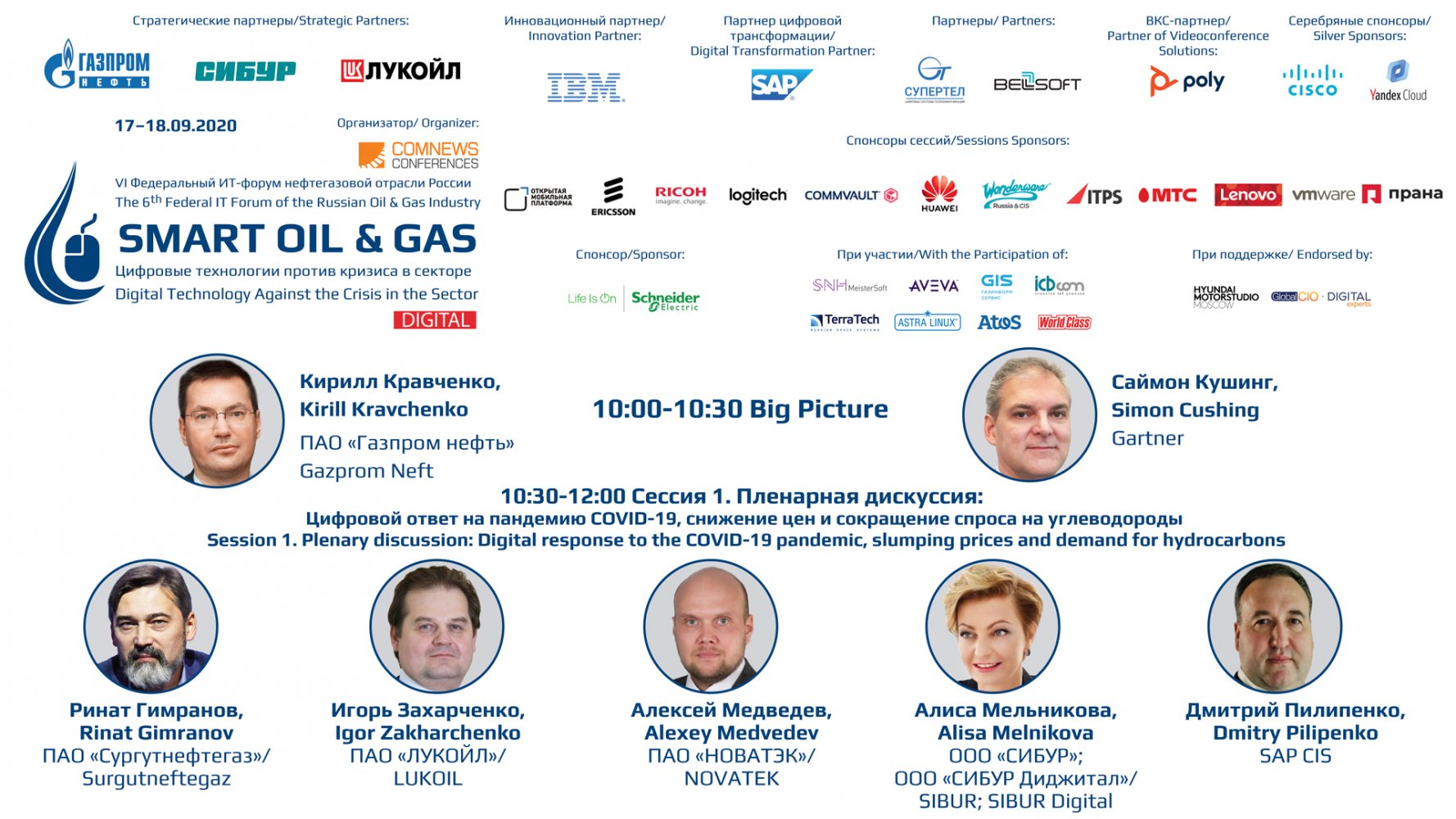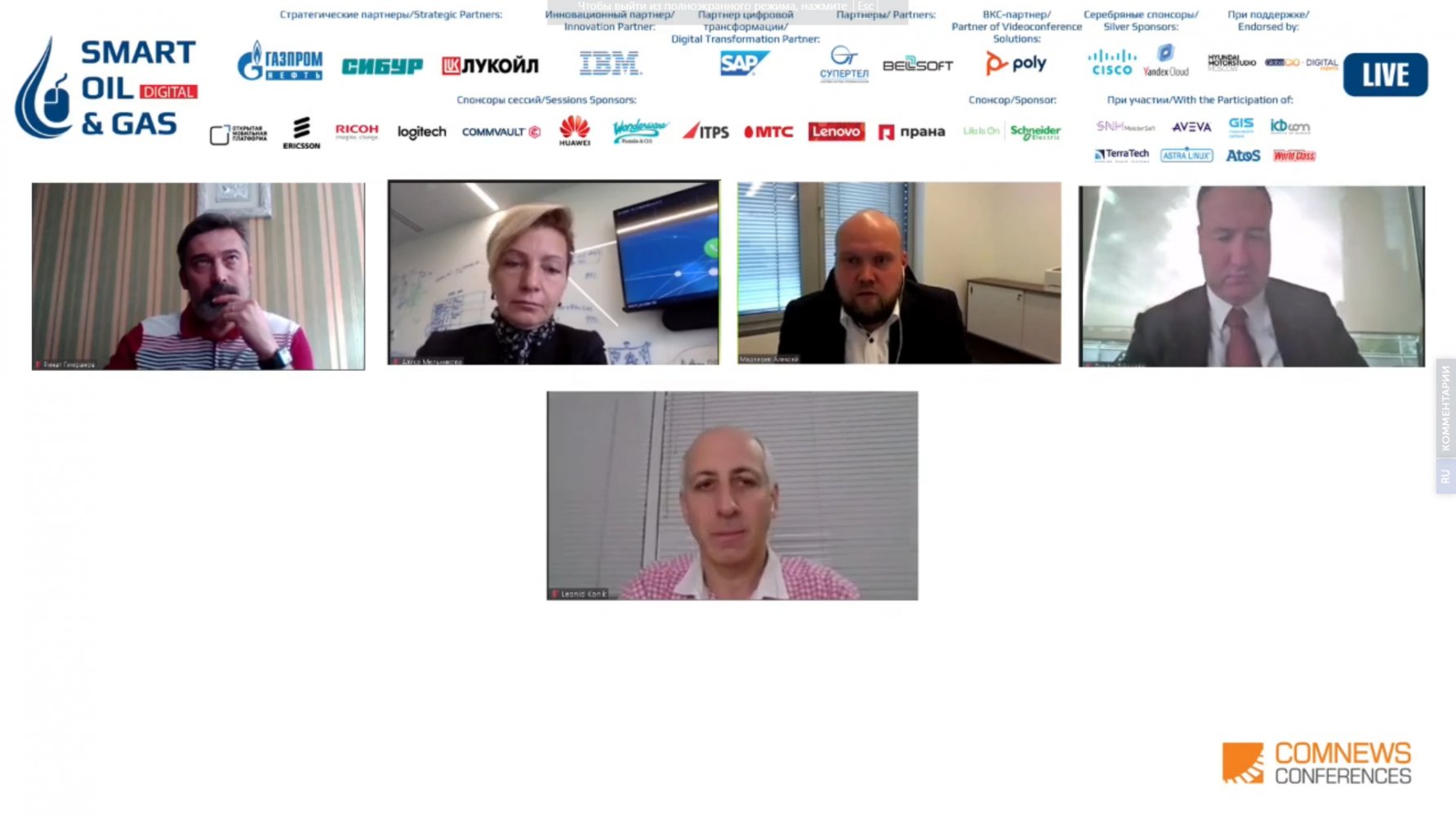About Event
Digital Technologies in Oil & Gas – Fast and Easy
|
Russian oil & gas sector is determined to continue investing into digital technologies, but there is a certain ambiguity. On one hand, the coronavirus pandemic and forced teleworking leave no doubts about the need for such technologies even among the most conservative leaders. But on the other, top executives want to know exactly what their people did as they were working from home – their “digital footprint” as a prerequisite for the switch to tele- or hybrid working as a new normal. Market participants are committed to digital transformation strategies, but in 2020, they are only willing to launch fast-payback and high-margin projects, postponing everything else till 2021. |
 |
|
“The first wave of COVID-19 has turned the balance between our online and offline workers around: we used to have 25% of the staff working online, and now this number is 75%. This will help us increase productivity and cut costs”
|
This is one of the conclusions voiced at the annual federal IT Forum of Russia’s Oil & Gas Industry “Smart Oil & Gas 2020”, which was held on Sept. 17-18 by ComNews Group for the sixth consecutive year, but this year the forum made its debut in the online format. The pandemic has had a major impact on oil & gas companies, because all around the world both the prices and the demand for hydrocarbons reduced drastically. Companies are forced to cut their corporate budgets, which hinders digital transformation, since the latter requires significant investments. For this reason, market players are faced with a challenging task: how to keep up the pace of digital transformation or even ramp it up amid shortfalls in revenue and budgets. |
|
“In the next three year, both the industry in general and our company Gazprom Neft will see a significant acceleration of digital transformation and implementation of online tools. The first wave of COVID-19 has turned the balance between our online and offline workers around: we used to have 25% of the staff working online, and now this number is 75%. This will help us increase productivity and cut costs,” Kirill Kravchenko, Member of the Board and Deputy CEO for Organizational Affairs of Gazprom Neft said at the plenary session of Smart Oil & Gas 2020. |
“In 2020, our priority is fast payback of our investments. Next year, hopefully we will get back to projects with longer payback period”
|
|
“We will do some cutbacks and move forward”
|
SIBUR’s Director for Digital Technologies and IT Alisa Melnikova says that her company’s vision and objectives in the 3-5 year perspective haven’t changed. However, SIBUR did select the digital projects with fast-payback above others: “In 2020, our priority is fast payback of our investments,” Melnikova said at Smart Oil & Gas 2020. “Next year, hopefully we will get back to projects with longer payback period.” |
|
NOVATEK’s CIO Alexey Medvedev agrees with such approach. “The situation on the market brought by COVID-19, has forced us to reconsider our priorities, but not the strategy of digital transformation as such,” he pointed out. Surgutneftegaz’s Head of IT Department Rinat Gimranov doesn’t see a reason to revise digital transformation strategies. According to him, when you have survived the economic crisis 1998, you won’t be scared of any other economic shocks. “We will do some cutbacks and move forward,” says Gimranov, optimistically. |
 |
|
“Right now we are looking at how to winnow chaff from grain with new tools or already existing solutions to get a clear picture of who is doing what and who is more efficient, and who not so much”
|
Igor Zakharchenko, Head of the Center for the Development of Information Technology Support of DITO, LUKOIL, told the audience that his company performed a three-phase selection process to come up with a list of the most remunerative and viable solutions. Nevertheless, at present LUKOIL is carrying out 90 digital initiatives. However, the company put the adoption of digital transformation strategy off until 2021. After forced stay-at-home period, many companies are holding off on bringing their staff back into the office, or are choosing to introduce hybrid teleworking. But there is also a new trend – executives need proof of efficiency of teleworking. |
|
Alexey Medvedev from NOVATEK pointed out that forced teleworking has revealed two different groups of employees, including IT staff: many people showed themselves well efficient and motivated, but there also were those, who eagerly “generated a digital footprint and frenzied activities and initiated pointless meetings in Skype or Zoom, which served for nothing, but were distracting for a large number of people.” “Right now we are looking at how to winnow chaff from grain with new tools or already existing solutions to get a clear picture of who is doing what and who is more efficient, and who not so much,” said Alexey Medvedev. |
 |
|
“A month and a half into lockdown, we were told to return to the office, and the top management wanted the IT department to report on our staff’s digital footprint: how did everyone perform?”
|
SIBUR’s Alisa Melnikova also pointed at the need to analyze the employee’s digital footprint during teleworking. She emphasized that the industry needs to come up with ways to assess the efficiency of teleworking, but so far there are no successful cases in this field. |
|
Igor Zakharchenko from LUKOIL says: “A month and a half into lockdown, we were told to return to the office, and the top management wanted the IT department to report on our staff’s digital footprint: how did everyone perform? Are we ready for teleworking? We gathered this info, and turns out that some people wouldn’t even open their e-mail for months. What do we do about these findings? Fire people?” Anyhow, companies don’t question the need for digital technologies, the debate is around their implementation. Gazprom Neft’s Head of IT, Automation and Telecommunications Department Anton Dumin kicked off his speech at Smart Oil & Gas 2020 as follows: “The online format of the Forum is kudos to the technologies, including the domestic developments.” |
“With digital products, the end user formula is: I need it, know how to use it, and actually use it”
|
|
“The online format of the Forum is kudos to the technologies, including the domestic developments”
|
During the pandemic, many core business managers started using different online services, and that was when they realized that digital transformation they had been hearing about for the last few years, is something tangible and real. Surgutneftegaz’ Rinat Gimranov said: “The new trend is a more simplified perception of digitalization: it used to be treated like something new and unseen (digital twins, digital footprint, virtual reality and etc.), whereas now it is associated with Skype, Zoom, Teams. Now managers say that digital is simple.” This may seem like an understatement, but it allows selling digital projects even to those people, who until recently were firmly against the new technologies. |
|
The common thread of both days of Smart Oil & Gas 2020 was the idea that it is not enough for companies to just implement new technologies and information systems, the important thing is to make sure that they are actually used in business processes, that line managers and end users know how to use them. “With digital products, the end user formula is: I need it, know how to use it, and actually use it,” summarized Vladimir Chizhikov, Head of the Center for Strategy and Development of Gazpromneft-Neffteservis. “None of the three elements of this formula can be omitted.” Industry representatives also unanimously agreed that over the past several years, they had introduced so many digital systems and technologies, that they shouldn’t aim for new deployments, instead they need to make sure that all the existing systems are used ubiquitously and efficiently. |
"The term Industry 4.0 will soon celebrate its tenth anniversary. A huge number of pilot projects and prototypes have been made, many local problems have been solved, but now the task is to apply this methodology for the entire production cycle of the company, taking into account the technological process complexity"
|
|
Over two days of the online forum Smart Oil & Gas 2020, representatives of all major oil & gas companies of Russia and software vendors discussed numerous aspects of IT and other digital technologies in the new realities. The professional dialogue was organized in 10 theme blocks. Apart from the Plenary discussion entitled “ Digital response to the COVID-19 pandemic, slumping prices and demand for hydrocarbons”, the forum program included the following sessions: “New ideas and proposals from global IT companies in response to drastic changes in the oil & gas market”, “Digital Upstream”, “Digital Downstream”, “Telecommunication systems and services for the oil & gas sector”, “AI and machine learning”, “Workplace of the future” (two parts – practical ideas and panel discussion), “Digital technologies to address increasing environmental demands and monitoring”, “In-house software development by oil & gas companies vs outsourcing” (also in two parts – introduction to unique innovative solutions and a panel discussion), “Outlook for digital technologies in oil & gas sector: revised opinions and forecasts”. Overall, Smart Oil & Gas 2020 gathered 575 professionals, including 70 speakers and panelists. Speakers represented all the key players of the industry – Gazprom Neft group (including its Serbian subsidiary NIS a.d.), SIBUR, LUKOIL, Gazprom (not only the head office, but also Gazprom Nedra, Gazprom Export, Gazprom EP International), NOVATEK, Surgutneftegaz, Rosneft, Zarubezhneft, Tatneft. Foreign participation included two speakers from the corporate center of Petronas oil company (Malaysia). At the concluding visionary session, oil & gas professionals were joined by their fellow colleagues from other industries, represented by such companies as Metalloinvest Group and InfoTrans (Russian Railways), along with senior members of global consulting companies Gartner and Accenture. |
Virtual 3D Exhibition
|
The forum was accompanied by a virtual 3D exhibition, which apart from companies’ installments featured stands dedicated to implementation of the seven end-to-end technologies formulated in the National Program “Digital Economy of the Russian Federation”. Unlike the offline exhibition, which traditionally accompanies our Smart Oil & Gas forums, the virtual expo didn’t close with the forum, it will be accessible all the way until Smart Oil & Gas 2021, scheduled for September next year. |
 |
Same as the previous five year, Smart Oil & Gas 2020 was supported by software development companies, which have something to show the oil & gas industry in terms of both unique solutions and successful cases in the industry.
|
The forum’s Innovations Partner was IBM Corporation. SAP was Digital Transformation Partner, while SUPERTEL and BellSoft were Partners. Poly was Video Conferencing Partner. Cisco and Yandex.Cloud were Silver Sponsors of the forum; Open Mobile Platform, Ericsson, ITPS, Ricoh, Logitech, Commvault, Huawei, Klinkmann SPb (Wonderware Russia & CIS), MTS, Lenovo Data Center Group, VMware and ROTEC (“Prana”) were Partners, while Schneider Electric chose the status of Sponsor. |
Smart Oil & Gas 2020 was also supported by AVEVA, SNH MeisterSoft, Gazinformservis, ICBCom, Terra Tech, Atos, Astra Linux, and World Class gyms. The forum was endorsed by Hyundai MotorStudio and professional community GlobalCIO | DigitalExperts. General Media Partner of the forum was Interfax. |
The 7th Federal IT Forum of Russia’s Oil & Gas Industry “Smart Oil & Gas” is scheduled for September 2021. The dates are to be announced later, but organizers are hoping it will be conducted in the offline format (in the real world).













